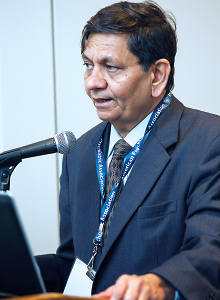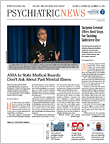There has been a great deal of investment in technologies such as genomics and metabolomics to advance the field of precision medicine in recent years. Last year, for example, President Obama unveiled a $215 million Precision Medicine Initiative to improve genetic databases and speed pharmacogenetic innovations through the Food and Drug Administration, among other proposals (
Psychiatric News, March 6, 2015).
Even as technological advances bring researchers closer to the goal of personalizing treatments so that the right medicine for the right person at the right time is delivered, several recent studies show how assessing changes in productivity and mood following exercise might predict patients most likely to respond to antidepressants.
“It would be unthinkable to treat diabetes without measuring a patient’s H1Ac levels to check their blood glucose,” Madhukar Trivedi, M.D., the Betty Jo Hay Distinguished Chair in Mental Health and Julie K. Hersh Chair for Depression Research and Clinical Care at the University of Texas Southwestern Medical Center in Dallas, told Psychiatric News. “Psychiatry also stands to benefit from incorporating simple measurement-based outcomes into routine care.”
Trivedi and colleagues found that regardless of depression severity, patients who showed a robust improvement in their work productivity during the first six weeks of antidepressant treatment had up to five times higher remission rates at three months and seven months compared with patients with slight or no productivity improvements.
Trivedi said that these findings suggest that productivity assessments during patient visits may help identify patients most and least likely to respond to the medication prescribed.
Exercise may offer another simple predictor of antidepressant response, Trivedi said.
His work with clinical studies such as the Treatment with Exercise Augmentation for Depression (TREAD) study has shown that physical activity can be an effective augmentation to standard antidepressant therapy. While the exact mechanisms by which exercise boosts antidepressant response remains unclear, studies show that exercise increases blood flow and the release of hormones that elevate mood and may also boost the formation of new connections in the brain.
As part of the TREAD study, Trivedi and colleagues randomly assigned participants to weekly sessions of either high- or low-impact exercise in addition to their medication. The researchers assessed the emotional state of the participants before and after each exercise session, using the Positive and Negative Affect Scale.
The researchers found that in the patients who performed high-impact exercise, a greater change in affect score (measured as the positive minus the negative scores) after just one session was predictive of better outcomes and remission after 12 weeks. The findings were published in the Journal of Clinical Psychiatry.
Trivedi said that such findings suggest that data contained in wearable devices such as Fitbits could offer clinicians a means of gauging response to therapy. For instance, if a patient has been active but has not responded to prescribed medication, it may signal a change of medication is needed.
While Trivedi said he sees the value of using genetic and biological markers to predict treatment response, incorporating measurement-based parameters such as productivity or energy expenditure into routine care can also help clinicians make more informed decisions to personalize patient care.
It’s valuable to consider such parameters since they look beyond the core symptoms of depression and focus more on functional recovery, he said.
“There has been this myth in psychiatry that if you improve symptoms, improved function will naturally follow,” he said. “But that is often not the case.”
Trivedi also stressed that these recent findings should be seen in the broader construct of mental health care.
“As psychiatrists, we must start thinking more about multimodal relief,” he told Psychiatric News. “With any single treatment, a patient will see improvements in certain domains, but it will not resolve all the pathology.”
He cited diabetes again as a good example for which multimodal strategies have taken hold. While measuring H1Ac is core to successful diabetes treatment, clinicians should encourage patients to look beyond their glucose levels and think closely about their diet, lifestyle, and other behaviors. ■
“Early Improvement in Work Productivity Predicts Future Clinical Course in Depressed Outpatients: Findings From the CO-MED Trial” can be accessed
here. “Affect Following First Exercise Session as a Predictor of Treatment Response in Depression” is available
here.

